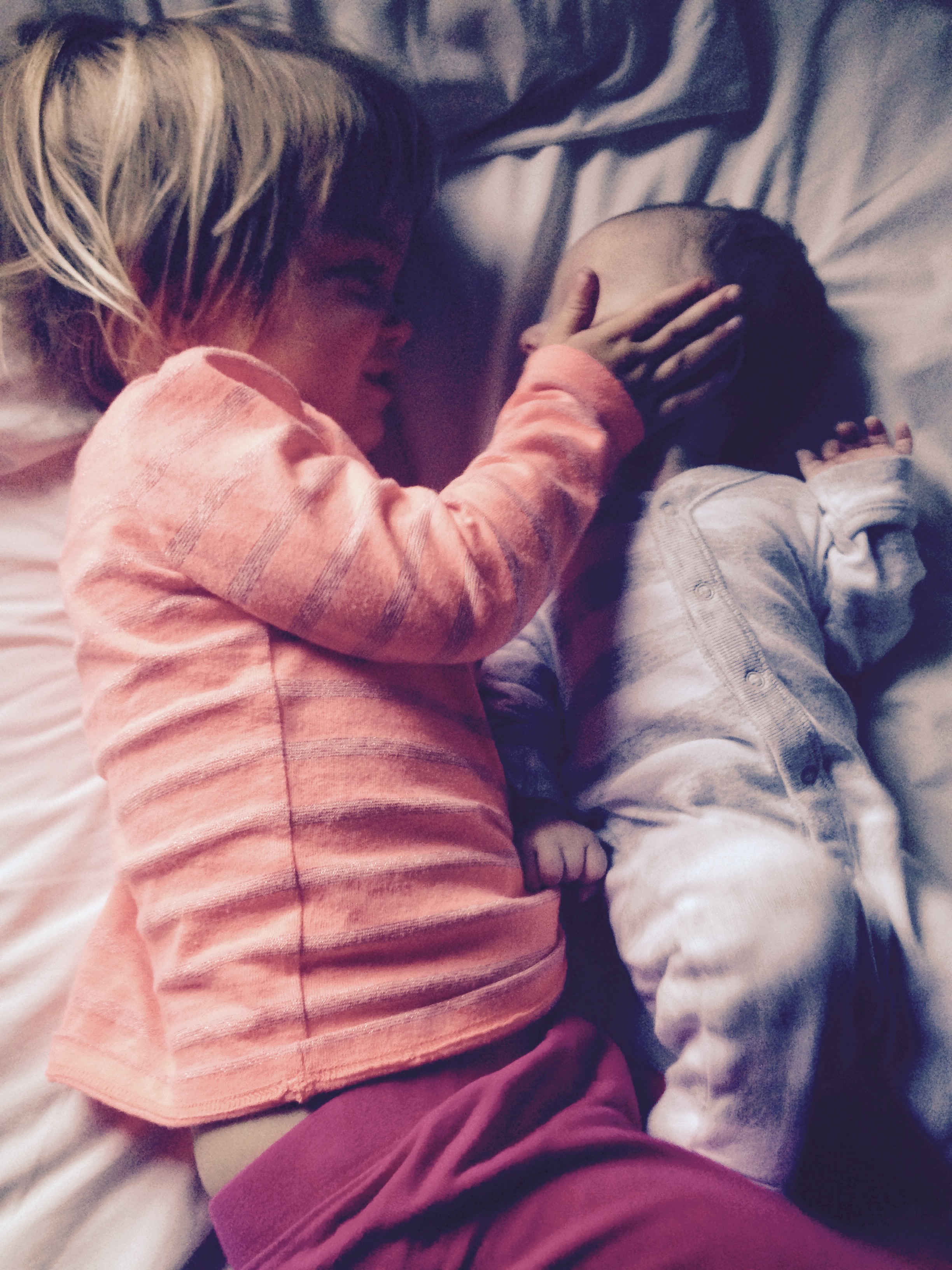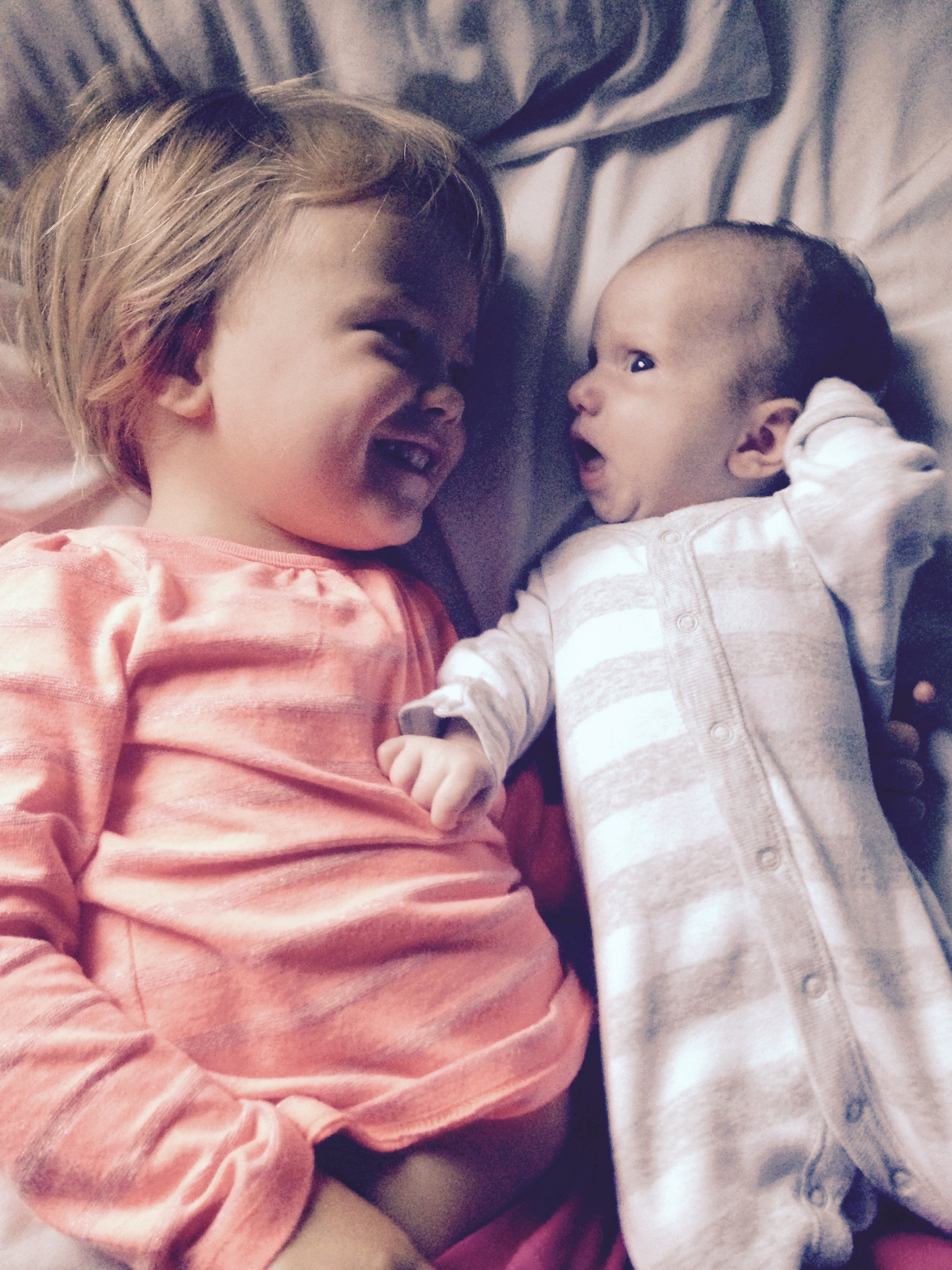Two Worlds
This week, I called my high school friend Lexie, a speech pathologist for kids ages birth to 3, to find out what we should be doing for Anna, and the answer is that we should start signing to her even this early. This will be Anna's deficit year before she gets cochlear implants. Whatever sounds would build to meanings have been missing for her since the day she was born. And in case the cochlear implants don't work (or when we've intentionally taken them out for bathtime and bedtime), we will need a language for her that doesn't depend on sound.
Besides the list of 200 recommended first words to learn, Lexie suggests supplementing it with the words that are the most important in our lives. We have a different vocabulary during this part of the year. I think: she will need to know salmon and fog and rain and cereal (which we eat a lot of when we're bored and which I think is the cutest sign so far: you make your index finger scoot like a little worm under your chin, wiping off the milk). Zaley and I made up the sign for Anna already: an "A" shaking back and forth like it's holding a maraca.
I have very little experience signing, but I do remember learning the prayers in grade school, especially the Our Father: an "L" (for law) in one hand stamped against the tablet of another for will; wiping the slate of the hand clean with the other hand for forgive; slicing one curved hand with the other, like a knife over a loaf, for bread; the letter d rising on one side of the body then setting on the other for day. I love the sensory basis of sign language, so much truer to experience than trying to explain in words. Zaley says, "We will make Anna happy with our hands."
Besides learning how to communicate with our child this year, we will spend these 12 months proving to our insurance company that Anna is a good candidate for cochlear implants (her total deafness qualifies her easily, but she'll also wear hearing aids for a year solely to keep active the auditory nerve). While the implants are usually very successful on infants, there's still a chance she won't speak or be able to decode music or talk on the phone. Some children break down crying when they're first turned on because sound makes no sense. They haven't ever heard a voice; it has no antecedent. Can you imagine? No, we can't.
The implant is a magnet that is surgically inserted between skin and skull, transmitting sound by radio wave or code or both--I get confused on the physics. Ears are complicated. I can't even really picture the work of the tiny hairs called cochlea except for the audiologist's metaphor: like tiny little piano keys rolled up inside each ear. To be honest, the thing that got me the most excited about cochlear implants (besides the fact they could bring to Anna speech and sound) are these. My friend Mia and I are already scheming on how to make them in bulk.
But part of me also wants to live a Little House on the Prairie life. And that part of me resists cochlear implants and the internet and all advancements in science. I know, I know. Look at how far we've come! Modern medicine saves lives, returns joy, restores hearing. But I look at this child and part of me doesn't want to mechanize one of her senses (the loss of which might be maximizing the skills of the others). Today, while Anna's eyes chased a flashlight across the whale-stenciled walls of the pediatrician's office, he said, "Man, she is really looking." Everyone comments on the hugeness of her eyes, the way they lock in on a thing, never blinking. What natural functions of her brain and being are we taking away if we add wires and magnets to the sides and insides of her head?
There is such a mystery to me about Anna's body. Her quietude and calm alertness, the texture of her silence. Is it static in there? Is it liquid-like or simply a void? Are there noises in there we can never imagine, like new colors, or a hundred wings flapping in the unseen space between her ears? I picture the sound would be like the look and feel of a cumulus cloud. Like soft cotton. Like comfort.
Luke pulls me up for air when I say I'm thinking about the two sides of the cochlear implant debate and says, "We're talking about giving her back her hearing."
And, in the end, even if we fit her with implants, Anna will always be deaf. Zaley's little friend Johnny, who's 8, happily (and out of the blue) reminded me yesterday that when Anna swims, she'll have to take out her implants and that will make her "deaf again." I take an odd comfort in this, knowing that she can take them out any time she wants--to go to sleep, to be free of the child we have decided she will be. I think of how nice it would be, to go into full silence mode right before bed. When Zaley yells every morning at the top of her lungs, "Mommy, come IN HERE," it will never wake our Anna.
Even though I imagined these girls doing everything together, including walking to St. Peter and Paul school down the street, I am realizing there may better options that will open worlds to us--to Anna--that would give her way more than my pre-Anna expectations ever could. The Jeff Co school district has resource rooms for children who sign. The Rocky Mountain School for the Deaf happens to be on our side of town (although Lexie confirmed yesterday what I've been sensing in the stories I've been reading: they may not accept students with cochlear implants because if a child can hear, is that child still deaf?). The Deaf School prepares children to be members of the Deaf community (capital D, indicating the specific culture of the deaf). I guess some people believe that cochlear implants take away not only a person's deafness, but their Deafness, too.
In one study in How the Deaf Learn, which my sweet dad found and shipped to me right after we found out about Anna, a young girl with cochlear implants said she sees herself as "not quite deaf and not quite hearing." Educators are unsure how best to teach kids who have implants; they often struggle in reading and writing. While the well of language is the deepest source of meaning in my life, it may be so bungled for Anna, it may be her deepest struggle. I want to give her everything I can, but for now all I find myself doing is smiling at her right near her face and signing I love you.
Lexie said our choice about cochlear implants, whatever it may be, should "help Anna enter the world where we live."
We live in two worlds, which is now more clear than ever. Our world in Denver with resources galore, a whole community of deaf children, long drives, more than one elementary school, and two kinds of (D)eaf. And then this world on this island: where I don't know a single deaf person other than my daughter. Where I had my six-week OB appointment at one hospital (executed by my next door neighbor, it turns out. Awkward.), then drove across the street to catch the last 15 minutes of Zaley's swim lesson, then drove another two minutes and over the only bridge here to the other hospital for Anna's six-week appointment.
On our way out, the sticker-stocked nurse from a few weeks ago called down the hallway, "Wait! Wait! I want to hold Anna again." She held Anna out in front of her, head higher than her feet, like a prize. "Anna! Swee-eet Anna!" she sung to her, clicking behind her teeth for the baby to respond, to move her head. I knew that Anna wouldn't look toward the sound of her name. But when she didn't, my heart still dipped.


